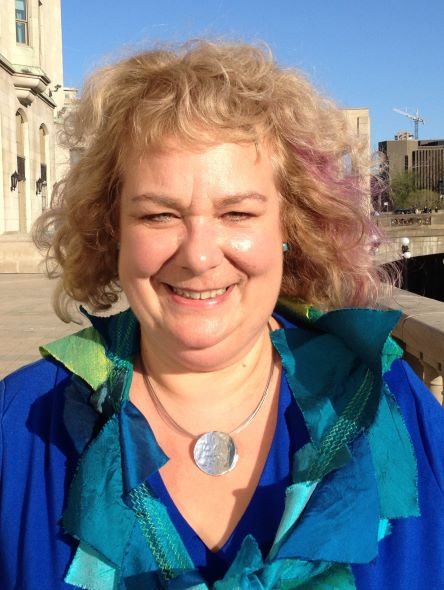
As part of our SE Profile series, CSED recently sat down with Elspeth McKay, the out-going Executive Director of Operation Come Home, to learn more about her pending (semi) retirement, reflections on a successful career and the advice she has for others.
Why did you decide to retire now?
I decided to transition into retirement now because it was time to hand the “reigns over” to someone else. I believe that all leadership positions should be changed from time to time. I did not want to leave Operation Come Home for another executive position as I loved my work at OCH. I have had a fantastic career full of innovation and creativity.
You’ve been a strong proponent of social enterprise over the years. How did you first get involved and how has it shaped your thinking?
I began my interest in social enterprise and community economic development when I returned to Canada after residing in Los Angeles for a couple of years. I took over as Executive Director of Rideau Street Youth Enterprises (RSYE) upon my return from the U.S. and RSYE provided me with hands on learning of social enterprise and the sector as a whole. This was in the mid 1990’s when the term social enterprise was almost non-existent and yet RSYE was developing “funky” businesses with vulnerable youth. At RSYE we operated five social enterprises and employed 35-40 young people at any given time. I then moved to Causeway where I assisted in the development of Krackers catering and a number of other social enterprises.
When I got to Operation Come Home, I had been developing and operating social enterprises with vulnerable populations for 15 years. Community economic development and social enterprise are one of many supported employment models that are considered best practice approaches to engaging vulnerable populations in work experience. I am a strong proponent of social enterprise and the remarkable impact that it has had on 100’s of youth at OCH over the years.
In terms of how it has shaped my thinking, I believe that finding solutions that address the root causes of poverty, marginalization, systematic discrimination and economic inequality are the ways to lift young people out of poverty. The solutions to address the root causes of inequities for vulnerable youth are based on four essential elements: employment retention; completion of high school; graduating from College/University/Apprenticeship and access to safe, affordable housing. I am a results oriented social entrepreneur that has a strong belief in taking mitigated risks for the good of the youth in which we serve.
What makes you most proud when you look back at your career?
I have been in the social service sector for 34 years and have had the privilege of serving the most vulnerable people in our community. With respect to Operation Come Home, I have built a small grassroots organization into a credible, results driven, innovative, sustainable, entrepreneurial agency. I have instilled a workplace culture in my staff to always make the extra effort on behalf of the clients that OCH serves.
There is no career more rewarding than being a part of “saves lives” and witnessing young people thrive and flourish. I have received so many messages since I announced my semi-retirement from young people as far back as RSYE thanking me for encouraging them, helping them, supporting them and believing in them; for this, I will be forever grateful. I am proud that I had the strength and courage to be a leader for all of these years and to help shape the lives of so many young people.
What would you say to your younger self if you could?
Never give up, there is no such thing as failure, be a risk taker, always persevere no matter what comes your way. Accept the fact that being a visionary and having a clear path to achieving your goals will ensure success. Recognize that being a leader is a vital role that you are well suited for and go for it…no matter what!
What’s next for Operation Come Home?
Operation Come Home is in excellent hands with my successor, John Heckbert. I chose John to succeed me because he has the passion for helping the most vulnerable young people in our community. John is a bright, well read, hard working, confident, administratively savvy young man that will take OCH to the next level. Our social enterprises are expanding, BottleWorks is profitable, we have employed 100’s of youth in our businesses over the years.
OCH will continue to operate as a hub that provides a menu of programs and services all of which are designed to encourage young people to become independent. OCH will continue to expand to provide additional mental health, addictions, supported employment, educational and housing services with multiple partners across the City of Ottawa and nationally with our reunite program. John will ensure that the priorities outlined in our strategic plan are completed. I can’t wait to see what John will do. I had a bucket list of things I was hoping to accomplish during my tenure and I am proud to say that I have achieved them all. Now is the time for new ideas, new leadership and new innovation.
What are your plans for the future?
I will be remaining at OCH part-time for 2022 where I will be an Executive Advisor for the new Executive Director and the Board to ensure the transition is seamless. I also plan to provide advise and expertise to other organizations in my areas of expertise: homelessness; supported employment; community economic development and youth.
I’m looking forward to spending time with my spouse, travelling, and being a happy homemaker for the first time in my life. In addition, I will be volunteering with a few select not for profits in Ottawa.
What advice do you have for other social enterprise practitioners?
My advice to social enterprise practitioners is to recognize the value in operating social enterprises. I will always believe that social enterprises exist as best practice approaches to supported employment for vulnerable populations. Operating businesses that have the additional social value element and having the ability to provide good quality products and services = success for the employees working within those businesses and success for the purchasers and suppliers of those entities.
A successful social enterprise practitioner will have a workplace culture that is entrepreneurial, leadership that recognizes the value of operating social business, a board of directors that is willing to take calculated risk, a good solid business plan with an emphasis on sales and marketing, advocates that ensure social procurement policies are in place within the public and private sector and a solid understanding of the value proposition. I believe these are some of the ingredients to a healthy, profitable, successful social business.



